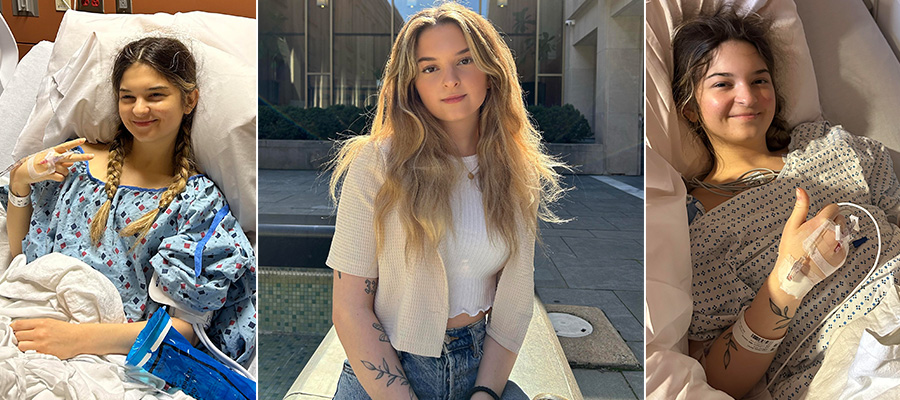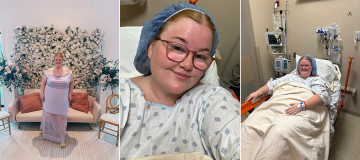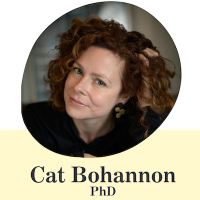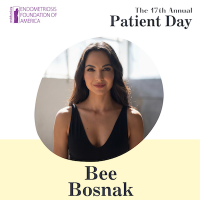
Sierra Demas spent most of 2024 locked in her apartment, isolated from the world. No job. No school. No gatherings with family or friends. Endometriosis had a physical and mental grip on her that was inescapable.
“It was very hard. I was in pain all the time, pretty much on the couch all day,” she said. “I went through a lot of anxiety and depression.”
Today, at the young age of 21, Demas is gradually reclaiming her life as she recovers from her second endometriosis surgery.
“I’m not a hundred percent, but I’m definitely feeling better,” she said. “I started a new job last week, and there’s a lot I want to do. There are still many things I can’t do, like taking a five-mile hike, but I’m working toward it.”
With her first period in seventh grade at age 13, Demas knew something was wrong.
“I had excruciating pain right off the bat. I would miss a lot of school that year and was always throwing up or felt like I’d pass out,” she said. “I knew that wasn’t normal, but I still wondered if I was being dramatic since my friends were getting their periods but weren’t going through that. Fortunately, my parents were super supportive and knew I wouldn’t be doing this unless something were seriously wrong.”
Despite her and her family’s search for answers, Demas would continue to struggle with the pain throughout high school. She’d continue missing classes, couldn’t plan any social activities, and was in the hospital monthly.
“I’d gone through 10 doctors by the time I was 18,” she said. “They did test after test but kept saying everything was normal, that there was nothing wrong. I tried birth control but had a lot of bad experiences with that, like paranoia and depression.”
Demas refused to accept her fate and, through her continued research, learned about endometriosis. Convinced this disease was likely the culprit of her agony, she found a specialist in her home state of Pennsylvania, who did a diagnostic laparoscopy in March 2023.
“My surgeon told me it was the most endometriosis she’d ever seen, especially in someone my age,” Demas said. “Since they weren’t expecting to find so much, they didn’t have a general surgeon in the room, so they had to leave the endometriosis that was on my bowels and colon. I knew I’d have to go back for another surgery, but at that point, I didn’t think much of it because I still didn’t understand the disease or the extent of how bad it could get.”
Demas said the surgery did little to relieve her pain. She continued seeing doctor after doctor and, at one point, had no less than four appointments a week, including with her surgeon, a gastroenterologist, a pelvic floor therapist, and a nutritionist.
Thirteen months after that surgery, in April 2024, the symptoms became unbearable, and her life spiraled. That’s when Demas was forced to quit her job and isolated herself in her apartment for virtually the rest of the year.
“I found another specialist here in New Jersey [where Demas lives today] because my other specialist who’d done the surgery moved out of network,” she said. “In November, this new specialist worked with a colorectal surgeon to remove what had been left on my bowels from the first surgery, but they also found that it had grown a lot. It was on my abdominal side walls, bladder, intestines, ovaries, rectum, and uterus. They had to remove my appendix and fallopian tubes. It was everywhere.”
The surgery was so intense that Demas had to have two blood transfusions because of internal bleeding and experienced seizure-like activity. She was finally able to return home two weeks later.
“As soon as I got home, I celebrated that I was able to stand up for a couple of hours,” she said.
Two major milestones since then are that she’s back to work—at a hospital as a patient service representative—and attending college, pursuing a degree in business administration. And as she regains her strength, she’s dedicating considerable energy toward speaking about endometriosis.
“I’m very big on talking about it; that’s what’s going to bring awareness,” Demas said. “If we treat it like the plague and don’t talk about it, more people will go through what I’ve had to go through.”
She’s also encouraging others with the disease to stand up for themselves.
“I’ve always been a passionate and motivated person, and I’m grateful that I was persistent in trying to figure out what was wrong with me even when so many doctors shot me down,” Demas said. “People need to advocate for themselves. This type of pain and experience is not normal. You know your body, and the doctor isn’t always right. If you feel like something is wrong, it probably is. And don’t feel ashamed. A lot of young girls are ashamed of their periods and period pain. All women go through it, and it’s okay to talk about it.”
*Patient stories submitted to EndoFound.org are the patient's views, not necessarily those of the foundation. All testimonials are from real patients, may not reflect the typical patient’s experience, and are not intended to represent or guarantee that anyone will achieve the same or similar results.









